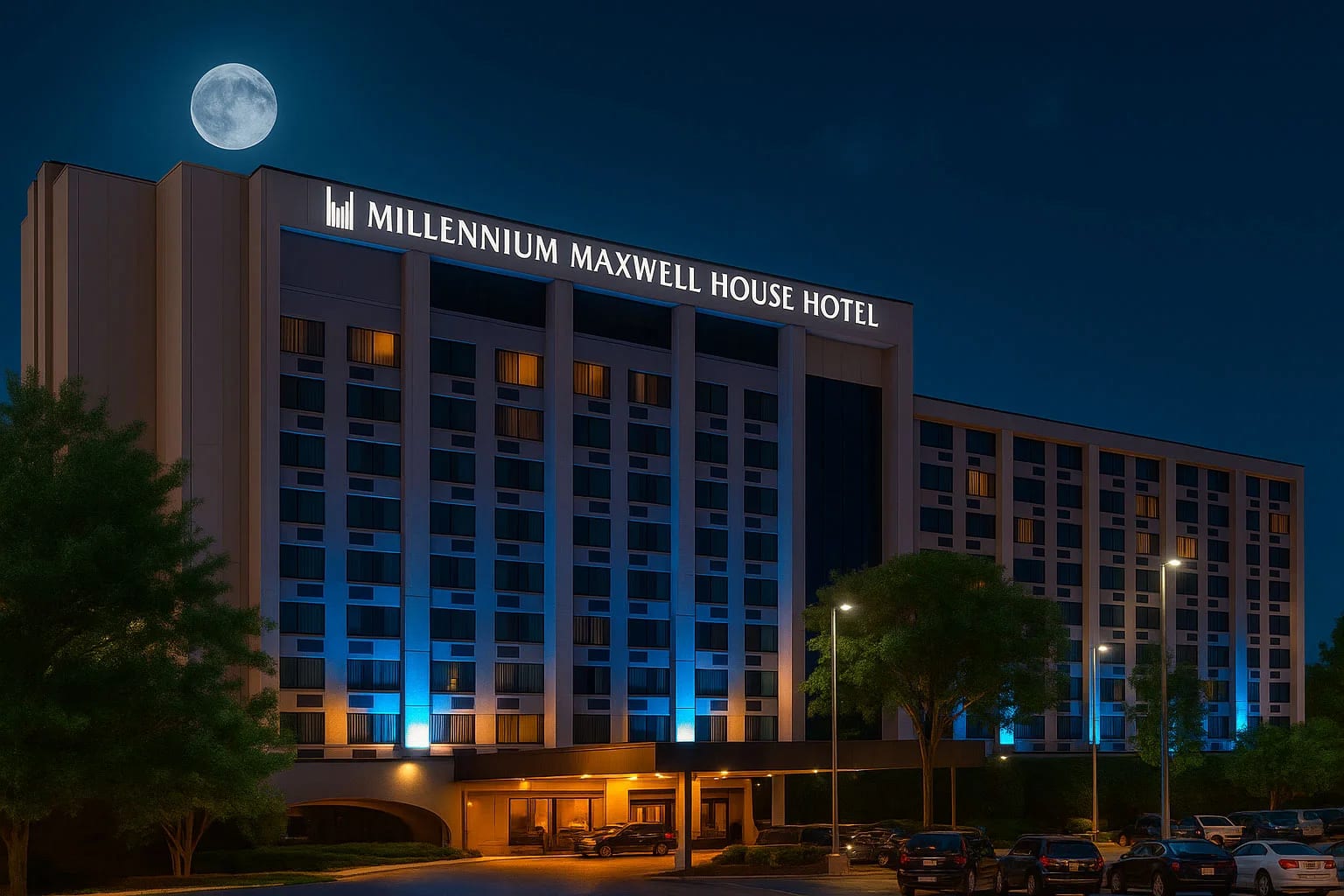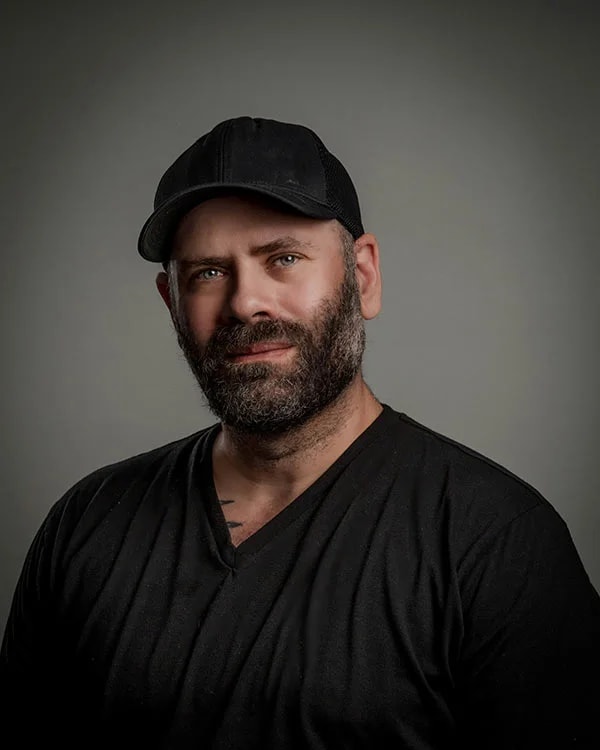The Maxwell House Hotel site now houses modern office buildings and commercial spaces in downtown Nashville. Nothing remains of the original grand hotel except its legacy—and, according to many witnesses, the tormented spirits of those who suffered within its walls during the Civil War. The concentration of death, suffering, and trauma that occurred here during the war years created what paranormal investigators consider one of the most psychically charged locations in Nashville.
The Grand Hotel
When it opened in 1859, the Maxwell House represented the height of Southern hospitality and luxury. The five-story building featured elegant guest rooms, a renowned dining room, and modern amenities. It quickly became the place to stay in Nashville, hosting politicians, entertainers, and wealthy travelers. The hotel was named after John Overton Jr., whose wife's maiden name was Maxwell.
The hotel's most famous claim came decades later, when President Theodore Roosevelt allegedly declared the hotel's coffee 'Good to the Last Drop,' a slogan the Maxwell House coffee brand adopted (though historians debate whether this story is true or marketing legend). But before the coffee fame, the hotel endured its darkest chapter during the Civil War.
Military Seizure and Prison
When Union forces occupied Nashville in February 1862, they immediately commandeered the Maxwell House and other large buildings for military use. The hotel's elegant rooms were stripped of luxury furnishings and converted into prison cells and hospital wards. Confederate prisoners of war, captured in battles around Tennessee and Kentucky, were brought to Nashville and confined in the Maxwell House.
Conditions for prisoners were brutal:
- Severe overcrowding, with men packed into rooms designed for half their number
- Inadequate food and water
- No heating in winter, causing frostbite and exposure deaths
- Limited sanitation, leading to rampant disease
- Guards who were often cruel, particularly to prisoners who refused to take a loyalty oath
- Some prisoners were subjected to interrogation and torture
- Men died from wounds, disease, malnutrition, and despair
Unlike formal military prisons with records and accountability, the Maxwell House operated in a legal gray area. Exact numbers are unknown, but historians estimate hundreds of Confederate prisoners died there, many buried in unmarked graves or mass burials. Few families were notified of their loved ones' deaths.
Hospital for Union Troops
Simultaneously with its use as a prison, parts of the Maxwell House served as a hospital for Union soldiers. The same building held Confederate prisoners on some floors and Union patients on others—a cruel irony that added to the building's psychic trauma.
The hospital treated:
- Battle wounds from engagements around Nashville and Tennessee
- Disease—typhoid, dysentery, pneumonia, and other camp diseases killed more soldiers than combat
- Amputations were performed with minimal anesthesia
- Infections that modern antibiotics would easily cure proved fatal
- Soldiers who survived their initial wounds often died later from complications
Civil War medicine was primitive. Surgeons didn't understand germ theory, antiseptics were unknown, and amputations were the standard treatment for most serious wounds. The Maxwell House hospital had limited supplies, overwhelmed staff, and growing numbers of sick and wounded. The building smelled of blood, gangrene, chloroform, and death. Screams of men undergoing surgery or dying from infection were constant. This concentrated suffering left an indelible psychic mark.
After the War and Demolition
After the Civil War ended, the Maxwell House was restored and returned to hotel use. It operated successfully for nearly another century, though staff and guests occasionally reported strange occurrences—sounds with no source, apparitions in hallways, cold spots, and feelings of being watched.
The hotel suffered a major fire in 1961 and was demolished shortly after. Modern buildings now occupy the site. But construction workers, building staff, and people who work in the area report continuing paranormal activity. The destruction of the physical building appears to have done nothing to disperse the spirits trapped there. If anything, some believe disturbing the ground where so much suffering occurred intensified the haunting.
The Confederate Prisoners
The most frequently reported spirits are Confederate prisoners—young men who died far from home, many never identified. Witnesses in buildings on the site and surrounding area describe:
- Men in ragged gray uniforms appearing in hallways, stairwells, and basements
- Soldiers who appear malnourished and sickly, consistent with prison conditions
- Some appear injured or dying, calling out for help or water
- Apparitions of men chained or behind bars, even though no physical barriers exist
- The overwhelming emotion of despair, homesickness, and abandonment
- Some spirits appear confused, as if they don't understand they're dead
- Others seem to be searching for something—perhaps a way home or loved ones
One office worker reported: 'I was working late and saw this young guy in old-fashioned clothes sitting in the corner. He looked sick and miserable. I asked if he was okay, and he looked right at me with the saddest eyes and said, "I just want to go home." Then he was gone. I left and didn't come back to that building for a week.'
The Surgeon's Ghost
Multiple witnesses have reported encountering a man in a blood-stained apron, believed to be a Civil War surgeon who worked in the Maxwell House hospital. He's described as:
- Middle-aged, with thinning hair and an exhausted expression
- Wearing a white or cream-colored apron stained with blood
- Carrying what appears to be medical instruments
- Moving with purpose, as if rushing to tend to patients
- Sometimes appearing to be washing his hands, over and over
- Occasionally heard muttering or giving medical instructions
- Creating an overwhelming feeling of urgency and stress when present
Some psychics believe he's the spirit of a surgeon traumatized by the number of men he couldn't save, trapped in an eternal loop of trying to provide care. The sight of him is particularly unnerving because witnesses report the blood on his apron looks fresh, as if he just left an operating theater.
The Sounds of Suffering
People who work in buildings on or near the Maxwell House site frequently report hearing sounds from the Civil War era:
- Moaning and crying from men in pain
- Screaming, particularly during late night/early morning hours
- The sound of sawing (consistent with amputation procedures)
- Footsteps in military boots marching in formation
- Chain rattling, from prisoners in shackles
- Doors slamming and locks clicking
- Men calling for water, for doctors, for their mothers
- Prayers and hymns being sung
- What sounds like a large number of people coughing
These sounds are most commonly reported in basement areas, stairwells, and older parts of buildings on the site. Security guards working overnight shifts find these sounds particularly disturbing, with some refusing to work alone.
The Woman in Black
Several witnesses have reported seeing a woman in black Victorian mourning dress in and around the Maxwell House site. She's believed to be:
- Either a nurse who worked in the hospital and died
- Or a widow searching for her husband who died at Maxwell House
- Always dressed completely in black, in a style from the 1860s
- Moving slowly, often with her head down, appearing to be grieving
- Sometimes carrying flowers or a handkerchief
- Creating an atmosphere of profound sadness when she appears
- She never speaks, but witnesses report feeling overwhelming grief
- Often seen near windows or looking out as if watching for someone
Unlike the soldiers and medical staff, her presence feels less trapped and more intentional—as if she returns regularly to mourn the dead or search for someone who never came home.
Shadow Figures and Mass Manifestations
Given the number of people who died at Maxwell House, some paranormal activity involves what appears to be groups or masses of spirits:
- Shadows moving in formation, like marching soldiers
- The impression of a crowd when entering certain spaces
- Feeling surrounded by unseen presences
- Some witnesses report seeing what looks like rows of beds or bodies, visible for just a moment before vanishing
- Areas that feel impossibly crowded, as if full of people, despite being empty
- Photographs sometimes show numerous orbs or unexplained figures
- EVP recordings pick up multiple voices talking over each other
These mass phenomena suggest that the psychic imprint of hundreds of men suffering and dying in close quarters has created a residual haunting where their collective presence replays.
Modern Encounters
People who work in modern buildings on the Maxwell House site regularly report:
- Electronics malfunctioning inexplicably
- Cold spots in buildings with functioning climate control
- Elevators stopping at floors where no one pressed buttons
- Sensing someone behind them when alone
- Feeling suddenly ill or dizzy in certain areas
- Doors opening and closing on their own
- Security systems triggering without cause
- Some employees absolutely refuse to work late or alone
- Cleaning crews report objects moved, lights turned on/off
- Several businesses have had priests or other clergy bless their spaces
The phenomena seem concentrated in lower floors and basements—areas that would have been prison cells and surgical/morgue areas in the original hotel. Some building managers acknowledge the hauntings informally but avoid official discussion, concerned about property values and employee morale.
The Maxwell House Site Today
The original Maxwell House Hotel is gone, demolished in 1961. The site, located at Fourth Avenue and Church Street in downtown Nashville, is now occupied by modern office buildings and commercial spaces. There is no museum or monument to the hotel's Civil War history, though historical markers nearby discuss Nashville's occupation.
For those interested in the haunted history:
- The general area is accessible as it's public downtown Nashville
- Some Nashville ghost tours discuss the Maxwell House history
- The surrounding sidewalks and public areas where phenomena are reported can be visited
- However, the buildings themselves are private commercial property
- Be respectful of the businesses and people who work there
- Historical research can be done at Nashville libraries and Civil War archives
Important notes:
- Do not trespass on private property
- Commercial buildings on the site are not tourist attractions
- If you work in a building on this site and experience phenomena, you're not alone
- Some believe acknowledging the spirits respectfully helps
The Maxwell House Hotel site stands as a reminder that Nashville's Civil War history isn't just in books and museums—it's still present in the land itself. The spirits of young men who died as prisoners or patients, far from home and mostly forgotten, remain in the place where they drew their last breaths. Their hauntings serve as a memorial to the Civil War's human cost, ensuring that their suffering, if not their names, will be remembered.

The grand hotel that became a prison and hospital of death

Where Confederate prisoners and Union soldiers still haunt

